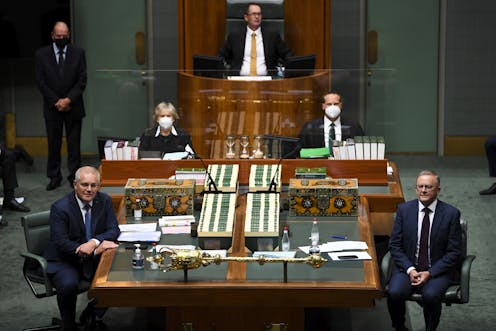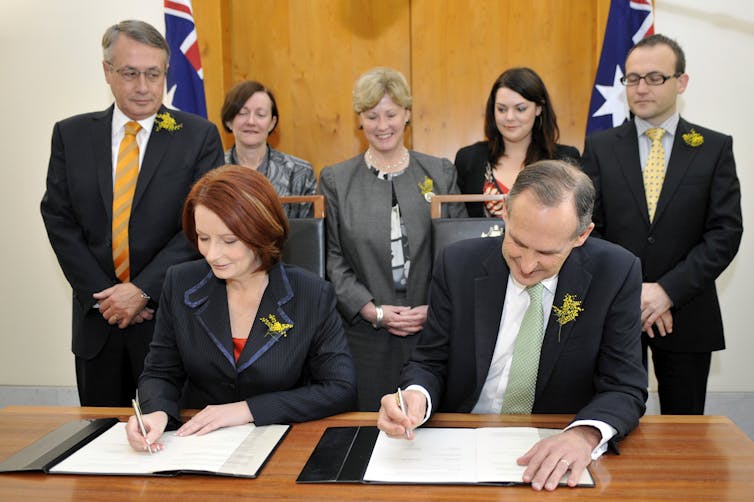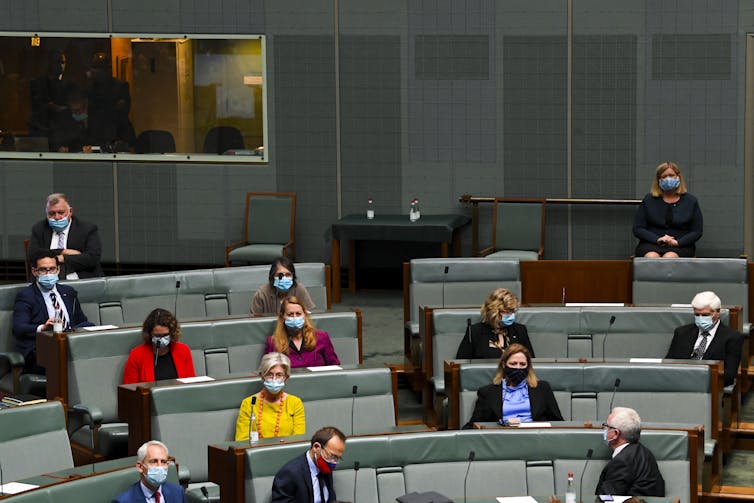
What happens if no party or coalition of parties wins a majority in the House of Representatives at the federal election? This is known as a “hung parliament”.
While it is unusual at the federal level, it has happened more often at state and territory level, so there is lots of experience in dealing with them in Australia.
The prime minister gets to choose what happens next
An election does not terminate the existing government. It continues in office as a caretaker government until a new government is formed, so there is never a gap between governments. An inconclusive election does not mean no-one is in charge.
Contrary to popular belief, it is not up to the governor-general to “call upon” someone to form a new government after an election. This is because there is no vacancy in the office of prime minister until the prime minister resigns.
If the result of the election is unclear, or the results leave neither side with a majority so the balance of power will be held by independents and members of small parties (known as “crossbenchers”), then it is up to the prime minister to decide what to do next.
The prime minister could choose to:
resign on behalf of the government, which is normally what occurs if it is clear that enough of the crossbenchers are going to support the other side
stay in office while negotiating with the crossbenchers to see who they will support (and resign if they choose the other side)
stay in office and face parliament to see whether the lower house votes no-confidence in the government (in which case the prime minister must, according to convention, resign) or whether the house is prepared to let the government stay in office as a minority government.

What is the governor-general’s role?
The role of the governor-general is limited. If the prime minister resigns on behalf of the government, convention requires the governor-general to appoint as prime minister the person most likely to command the support of a majority of the lower house.
This will usually be the leader of the opposition. In rare circumstances, where there are competing claims about who commands the support of the lower house, the governor-general might have some discretion. However, if the issue was contentious, the governor-general would probably leave it to the House of Representatives to decide by voting on who holds its confidence.
In the extraordinary circumstance where a prime minister refused to resign, even though the lower house had voted no confidence in them or their government, the governor-general would be entitled to dismiss the prime minister and commission a new one to form a government. But this has not happened in Australia and is extremely unlikely ever to occur.
Is it necessary to get a ‘confidence and supply’ agreement with the crossbenchers?
When there is a hung parliament, the focus is on whether enough of the crossbenchers will support one side or the other in government, by protecting it from a no-confidence vote and by passing its budget (known as “supply”).
Minority governments can be defeated on legislation and other motions in the lower house and continue in office, as long as they can get supply passed and do not lose the confidence of a majority of the lower house.
So where there is a hung parliament, both sides will ordinarily try to negotiate a “confidence and supply” agreement with enough crossbenchers to guarantee majority support on those two crucial matters. It is not necessary to have such an agreement, but it does help in providing stable government. It is also a good indicator to the governor-general of who commands the necessary support of the lower house.
That is why, despite comments that they won’t do “any deals”, it is likely that in the face of a hung parliament, both the prime minister and the opposition leader would try to negotiate confidence and supply agreements with enough crossbenchers to get majority support in the lower house.

In return for a promise of support on confidence and supply, the crossbenchers will usually impose some conditions. They may require the government to promise to implement certain policies (for example, measures to deal with climate change) or establish greater accountability (such as an anti-corruption body).
They may seek reforms on how parliament operates and demand adequate funding for existing accountability bodies, such as the auditor-general. They may also make their agreement on confidence conditional on the government not engaging in any corrupt conduct.
There are no rules about how these negotiations take place or how long it takes before an agreement is reached. Prime Minister Julia Gillard took over two weeks to negotiate confidence and supply agreements with enough crossbenchers to form a minority government. But if close elections are challenged in the Court of Disputed Returns, it can take months to obtain certainty. In the meantime, the existing government continues in office as a caretaker government.
Read more: Explainer: what are the caretaker government conventions?
Does a hung parliament result in chaos?
Hung parliaments can be effective or chaotic, or both, as the Gillard minority government showed. Forcing a government to explain and justify every bill on its merits, and negotiate amendments to reach a reasonable consensus, is no bad thing. It can result in significant improvements to government policy and legislation. A hung parliament can be a moderating force that knocks the ideological edges off policies and pushes them into the centre ground, where they have broad acceptance.
On the other hand, a hung parliament can result in governments failing to take hard, but necessary, measures that are in the country’s long-term interests. It can also result in horse-trading of support for bills and unfair favouritism directed towards projects in the electorates of the crossbenchers.
Whether a hung parliament ends up with policy paralysis and horse-trading on the one hand or major improvements in accountability and policy on the other, depends on the quality of both the government and the crossbenchers and their commitment to the public interest over self interest.
So when it comes to voting, it is wise to look beyond party or independent labels to the quality and commitment of the candidate you choose – because it may turn out to be very important.
Anne Twomey has received funding from the Australian Research Council and occasionally does consultancy work for governments, parliaments and inter-governmental bodies.
This article was originally published on The Conversation. Read the original article.







